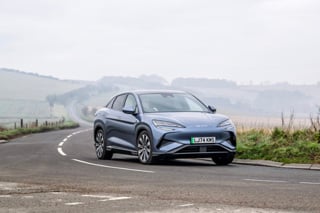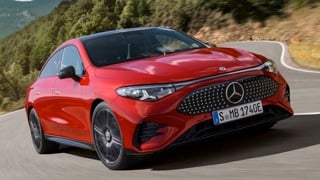Ford has warned it may restrict sales of internal combustion engine (ICE) vehicles in the UK to hit Government battery electric vehicle (BEV) targets, forcing a hike in prices.
The zero emission vehicle (ZEV) mandate, which came into force this year, requires more than a fifth (22%) of cars and 10% of vans sold by manufacturers to be fully electric.
The targets for manufacturers increase each year, requiring 80% of new cars and 70% of new vans sold in Great Britain to be zero emission by 2030, increasing to 100% by 2035.
However, Martin Sander, head of Ford’s European electric vehicles (EV) division, told the Financial Times Future of the Car summit that ZEV targets could force it to sell fewer ICE vehicles in the UK in order to increase its proportion of BEV sales.
“It’s really important for politicians to monitor what is going on and that the ZEV targets, this year, next year, going forward, are roughly in line with consumer demand,” he said. “This is what we need. You cannot push vehicles into the market against demand.”
He stressed that Ford was confident it would be able to comply with the mandate but was “not going to pay penalties”.
“The only alternative is to take our shipments of ICE vehicles to the UK down and sell them somewhere else,” he added. “I don’t know if consumers will like seeing the ICE prices going up.”
It comes just weeks after Stellantis, which owns several brands including Vauxhall, Peugeot and Citroen, also warned it could restrict sales of cars in the UK in response to the ZEV mandate.
The latest sales figures from the Society of Motor Manufacturers and Traders (SMMT) shows that Ford is falling short on both zero emission targets for cars and vans.
In the first four months of 2024, Ford sold 40,719 cars in the UK of which 1,437 were pure EVs, equating to just 3.5% – six times fewer than its mandated share.
Ford’s share of zero emission car sales is one of the lowest, with Volkswagen achieving 6.2% BEV registrations so far this year, Toyota 12.6%, Vauxhall 13.6%, Audi 17.5% and BMW 26%.
Ford is also struggling to get anywhere near the 10% target for zero emission vans for 2024. So far this year, just 1.9% (714) of the 37,474 vans it has sold were pure electric.
Renault at 7.8% and Vauxhall at 7.3% have faired better, and Peugeot is currently surpassing the ZEV mandate target for vans with a 13.8% BEV market share.
The latest market outlook from the SMMT shows a diminishing share for BEVs despite a growing overall new car market.
SMMT now anticipates that 1.984 million new cars will be registered in 2024 – a 4.2% rise on last year, and a 0.5% increase on January’s outlook.
However, BEV volumes for the year have been revised downwards, with anticipated market share now 19.8%, below the Government target of 22% per manufacturer under the ZEV mandate.
Mike Hawes, SMMT chief executive, said: “The new car market continues to grow even in the quieter months, driven primarily by fleet demand.
“This is particularly true of the electric vehicle sector, where the absence of Government incentives for private buyers is having a marked effect.
“Although attractive deals on EVs are in place, manufacturers cannot fund the mass market transition single-handedly.”
In terms of vans, deliveries of zero emission LCVs declined last month, according to SMMT figures, with the uptake of fully electric vans falling to 861 units, down 42.4% compared with last year’s uplift in demand.
It means BEVs accounted for just 3.6% of all new LCV registrations compared with 6.6% in April last year.
Matthew Davock, director of Manheim Commercial Vehicles at Cox Automotive, said: “While the new LCV figures mark the 16th consecutive month of growth, the news is overshadowed somewhat by the significant drop in BEV registrations.
"At this point, the number should be much stronger than the 23,889 LCV registrations recorded.
“I think there are two factors behind this performance. On one hand, we're seeing many fleet, rental, and SME van operators review their needs as their utilisation rates fluctuate. On the other, we're still experiencing a lack of buyer confidence in electrification.”























Login to comment
Comments
No comments have been made yet.